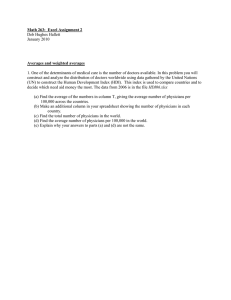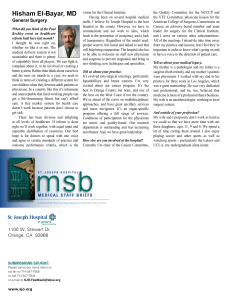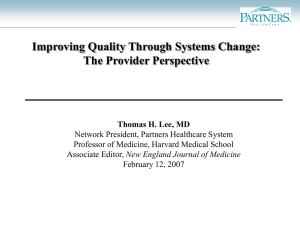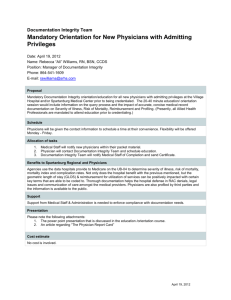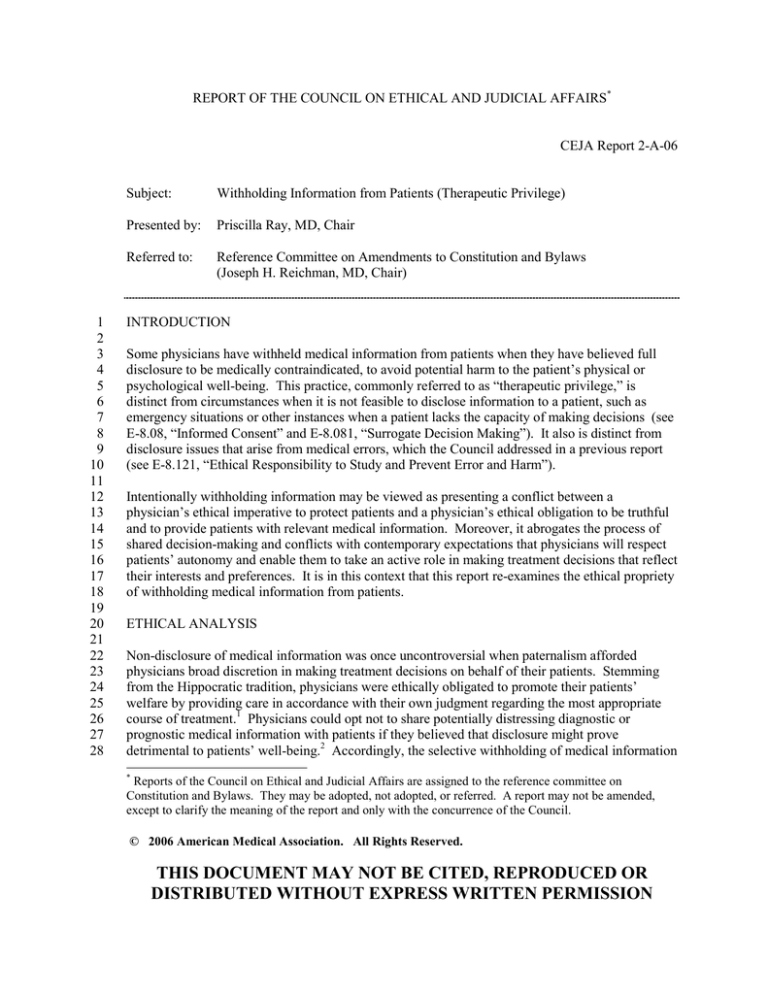
REPORT OF THE COUNCIL ON ETHICAL AND JUDICIAL AFFAIRS*
CEJA Report 2-A-06
1
2
3
4
5
6
7
8
9
10
11
12
13
14
15
16
17
18
19
20
21
22
23
24
25
26
27
28
Subject:
Withholding Information from Patients (Therapeutic Privilege)
Presented by:
Priscilla Ray, MD, Chair
Referred to:
Reference Committee on Amendments to Constitution and Bylaws
(Joseph H. Reichman, MD, Chair)
INTRODUCTION
Some physicians have withheld medical information from patients when they have believed full
disclosure to be medically contraindicated, to avoid potential harm to the patient’s physical or
psychological well-being. This practice, commonly referred to as “therapeutic privilege,” is
distinct from circumstances when it is not feasible to disclose information to a patient, such as
emergency situations or other instances when a patient lacks the capacity of making decisions (see
E-8.08, “Informed Consent” and E-8.081, “Surrogate Decision Making”). It also is distinct from
disclosure issues that arise from medical errors, which the Council addressed in a previous report
(see E-8.121, “Ethical Responsibility to Study and Prevent Error and Harm”).
Intentionally withholding information may be viewed as presenting a conflict between a
physician’s ethical imperative to protect patients and a physician’s ethical obligation to be truthful
and to provide patients with relevant medical information. Moreover, it abrogates the process of
shared decision-making and conflicts with contemporary expectations that physicians will respect
patients’ autonomy and enable them to take an active role in making treatment decisions that reflect
their interests and preferences. It is in this context that this report re-examines the ethical propriety
of withholding medical information from patients.
ETHICAL ANALYSIS
Non-disclosure of medical information was once uncontroversial when paternalism afforded
physicians broad discretion in making treatment decisions on behalf of their patients. Stemming
from the Hippocratic tradition, physicians were ethically obligated to promote their patients’
welfare by providing care in accordance with their own judgment regarding the most appropriate
course of treatment.1 Physicians could opt not to share potentially distressing diagnostic or
prognostic medical information with patients if they believed that disclosure might prove
detrimental to patients’ well-being.2 Accordingly, the selective withholding of medical information
*
Reports of the Council on Ethical and Judicial Affairs are assigned to the reference committee on
Constitution and Bylaws. They may be adopted, not adopted, or referred. A report may not be amended,
except to clarify the meaning of the report and only with the concurrence of the Council.
© 2006 American Medical Association. All Rights Reserved.
THIS DOCUMENT MAY NOT BE CITED, REPRODUCED OR
DISTRIBUTED WITHOUT EXPRESS WRITTEN PERMISSION
CEJA Rep. 2-A-06 -- page 2
1
2
3
4
5
6
7
8
9
10
11
12
13
14
15
16
17
18
19
20
21
22
23
24
25
26
27
28
29
30
31
32
33
34
35
36
37
38
39
40
41
42
43
44
45
could be viewed as fulfilling physicians’ obligations both to act beneficently2 and to promote
patients’ overall well-being.3
This practice of non-disclosure was well established in the foundational works of Western medical
ethics, such as Percival’s Medical Ethics, which promoted the beneficent withholding of medical
information to minimize patients’ distress. 4 Similarly, the 1847 AMA Code of Medical Ethics
stated that physicians had a “sacred duty…to avoid all things which have a tendency to discourage
the patient and depress his spirits.”5 These guidelines helped to establish legal precedents that
allowed physicians to withhold potentially harmful information from their patients in the event that
full disclosure would impede patients’ abilities to render rational decisions or harm them in other
ways.6
In recent decades, medical paternalism has given way to the contemporary concepts of patient
autonomy and shared decision-making.7 Today, physicians are called upon to promote patients’
well-being by openly discussing the balance between anticipated benefits of a given intervention
and its potential harms. 8 In some instances, a case-specific balance of benefits and harms may
appear to some physicians as justification to withhold medical information, with the beneficent
desire to protect patients from potential harms. However, a physician’s concealment of medical
information may not prove beneficent if it contravenes a patient’s own wishes.
Many patients want detailed medical information, even if it means receiving adverse diagnostic or
prognostic information.9,10 Physicians’ communication of detailed medical information has been
shown to ease patients’ anxiety and improve health outcomes.5 Moreover, increased levels of
communication and information sharing may also contribute to higher levels of patient
satisfaction11 and potentially decrease malpractice liability.12 Conversely, the lack of adequate
information may preclude patients from receiving necessary medical attention or making optimal
life decisions on the basis of their individual needs and personal values.13,14
Withholding pertinent medical information from patients without their knowledge or consent may
also have negative long-term consequences for the medical profession. The patient-physician
relationship is founded upon trust, because patients must rely upon their physicians to provide the
information needed to make a properly informed decision.15 Lack of candid disclosure can
compromise this relationship if patients suspect (or later discover) that information is being
withheld from them.16 Thus, individual physicians’ purportedly benevolent acts of deception risk
undermining not only individuals, but also public confidence and trust in the medical profession.17
In practice, medical information should never be permanently withheld from the patient because
doing so represents a clear violation of patients’ trust. However, physicians’ obligation of
beneficence may allow (or compel) them to postpone the full disclosure of information to patients
whose capacity to make competent medical decisions may be compromised, or when disclosure is
otherwise medically contraindicated.18 Delayed disclosure, however, is not justified when
physicians merely intend to prevent a patient’s refusal of medically necessary treatments,19 or to
instill hope for the future.20
Little is known of the extent to which disclosure of alarming medical information may ultimately
harm patients.21 Physicians are encouraged to consult colleagues or hospital ethics committees
THIS DOCUMENT MAY NOT BE CITED, REPRODUCED OR
DISTRIBUTED WITHOUT EXPRESS WRITTEN PERMISSION
CEJA Rep. 2-A-06 -- page 3
1
2
3
4
when considering the need to temporarily withhold medical information from their patients. Such
consultations reflect respect for patients’ right of self-determination and can be of real help to
physicians in assessing available alternatives to postponement of communicating medical
information.
5
6
7
8
9
10
11
12
13
14
15
16
17
18
19
20
21
22
23
24
25
26
27
28
29
30
31
32
33
34
35
36
37
38
39
40
41
42
43
44
When physicians determine that a patient should not receive all relevant medical information at a
given time, they need to continue to provide appropriate care for and monitor the patient to identify
an appropriate time to offer full disclosure. This should be done according to a definite plan, so
that disclosure is not permanently withheld.
PROMOTING PATIENT-PHYSICIAN COMMUNICATION
Physicians’ concerns about disclosure of potentially harmful information should lead them to
encourage patients to make choices regarding the receipt of medical information before potentially
harmful information becomes available.22 Physicians should tailor their disclosure of medical
information in response to the needs, expectations and preferences of individual patients.23
To respect patients’ rights of decisional autonomy, physicians must offer all patients the
opportunity to receive relevant medical information.24 This may be accomplished by asking
patients to specify the scope of information they wish to receive and their preferred methods for
receiving it. Physicians should then honor these preferences to the extent practicable.
Some patients may want certain medical information to be withheld.25 Others may wish to involve
family members in the decision-making process or, alternatively, to appoint family members or
trusted caregivers to act as their proxy.26 Physicians should respect the wishes of competent
patients, including accommodation of their cultural and religious beliefs.27 However, physicians
should consider patients’ decisions sensitively to ensure that their requests are not coerced and
genuinely represent the patients’ preferences.13 Additionally, physicians should educate patients
and their proxies about the importance of disclosure and shared decision-making.13
When communicating medical information, physicians should assess the amount of information
that patients want and are capable of receiving at a given time.28 Clinical judgment is required to
determine the appropriate means for communicating relevant information, taking patients’
personalities and clinical histories into account when possible.2 Information should be presented in
a way that patients can understand and use in making medical decisions.13 Finally, physicians
should attempt to confirm that this information has been understood—for example, by asking them
to repeat what they have been told—and providing further clarification as necessary.29,30
Physicians should communicate all requested medical information sensitively and respectfully,31
while seeking to minimize any negative effects upon the patient.32 By listening to patients’
concerns and responding to their individual needs, physicians can promote the patient-physician
relationship33 and protect against the iatrogenic suffering of patients.34 Physicians can also
minimize potential harms by monitoring patients’ well-being and by helping them to access
appropriate support services, when needed.21
THIS DOCUMENT MAY NOT BE CITED, REPRODUCED OR
DISTRIBUTED WITHOUT EXPRESS WRITTEN PERMISSION
CEJA Rep. 2-A-06 -- page 4
1
2
3
4
5
6
7
CONCLUSION
Withholding relevant medical information from patients without their knowledge or consent, in an
attempt to minimize potential physical or psychological harms, has been called “therapeutic
privilege.” This practice creates a conflict between physicians’ concurrent obligations to act
beneficently and to respect patients’ autonomy. Whenever possible, physicians should minimize
the withholding of medical information by accommodating patients’ informational preferences.
THIS DOCUMENT MAY NOT BE CITED, REPRODUCED OR
DISTRIBUTED WITHOUT EXPRESS WRITTEN PERMISSION
CEJA Rep. 2-A-06 -- page 5
1
2
3
4
5
6
7
8
9
10
11
12
13
14
15
16
17
18
19
20
21
22
23
24
25
26
27
28
29
30
31
32
33
34
35
36
37
38
39
40
41
42
43
44
45
RECOMMENDATIONS
The Council on Ethical and Judicial Affairs recommends:
(1) That the following statement be adopted as new policy, to be subsequently issued as a new
ethical opinion:
Withholding pertinent medical information from patients under the belief that disclosure is
medically contraindicated, a practice known as “therapeutic privilege,” creates a conflict
between the physician’s obligations to promote patients’ welfare and respect for their autonomy
by communicating truthfully. Therapeutic privilege does not encompass withholding medical
information in emergency situations, or reporting medical errors (see E-8.08, “Informed
Consent,” and E-8.121, “Ethical Responsibility to Study and Prevent Error and Harm”).
Withholding medical information from patients without their knowledge or consent is ethically
unacceptable. Physicians should encourage patients to specify their preferences regarding
communication of their medical information, preferably before the information becomes
available. Moreover, physicians should honor patient requests not to be informed of certain
medical information or to convey the information to a designated proxy, provided these
requests appear to genuinely represent the patient’s own wishes.
All information need not be communicated to the patient immediately or all at once; physicians
should assess the amount of information a patient is capable of receiving at a given time,
delaying the remainder to a later, more suitable time, and should tailor disclosure to meet
patients' needs and expectations in light of their preferences.
Physicians may consider delaying disclosure only if early communication is clearly
contraindicated. Physicians should continue to monitor the patient carefully and offer complete
disclosure when the patient is able to decide whether or not to receive this information. This
should be done according to a definite plan, so that disclosure is not permanently delayed.
Consultation with patients’ families, colleagues or an ethics committee may help in assessing
the balance of benefits and harms associated with delayed disclosure. In all circumstances,
physicians should communicate with patients sensitively and respectfully.
(New HOD/CEJA Policy)
(2) That amendments to Opinion E-8.08, “Informed Consent,” proposed below be made at the time
the statement above is issued as a new opinion:
E-8.08, “Informed Consent”
The patient’s right of self-decision can be effectively exercised only if the patient possesses
enough information to enable an intelligent informed choice. The patient should make his or
her own determination on treatment. The physician’s obligation is to present the medical facts
accurately to the patient or to the individual responsible for the patient’s care and to make
THIS DOCUMENT MAY NOT BE CITED, REPRODUCED OR
DISTRIBUTED WITHOUT EXPRESS WRITTEN PERMISSION
CEJA Rep. 2-A-06 -- page 6
1
2
3
4
5
6
7
8
9
10
11
12
13
14
15
16
17
18
19
20
21
22
23
24
25
recommendations for management in accordance with good medical practice. The physician
has an ethical obligation to help the patient make choices from among the therapeutic
alternatives consistent with good medical practice. Informed consent is a basic social policy in
both ethics and law that physicians must honor, for which exceptions are permitted: (1) where
the unless the patient is unconscious or otherwise incapable of consenting and harm from
failure to treat is imminent. In special circumstances, it may be appropriate to postpone
disclosure of information, (see Opinion E-8.122, “Withholding Information from Patients”). or
(2) when risk disclosure poses such an immediate and serious psychological threat of detriment
to the patient as to be medically contraindicated Social policy does not accept the paternalistic
view that the physician may remain silent because divulgence might prompt the patient to
forego needed therapy. Rational, informed patients should not be expected to act uniformly,
even under similar circumstances, in agreeing to or refusing treatment.
Physicians should sensitively and respectfully disclose all relevant medical information to
patients. The quantity and specificity of this information should be tailored to meet the
preferences and needs of individual patients. Physicians need not communicate all information
at one time, but should assess the amount of information that patients are capable of receiving
at a given time and present the remainder when appropriate. (I, II, III, IV, V, VIII)
Issued March 1981. Updated June 2006, based on the Report “Withholding Information from
Patients (Therapeutic Privilege).”
(Modify HOD/CEJA Policy)
(3) That the remainder of the report be filed.
Fiscal Note: Staff cost estimated at less than $500 to implement.
THIS DOCUMENT MAY NOT BE CITED, REPRODUCED OR
DISTRIBUTED WITHOUT EXPRESS WRITTEN PERMISSION
CEJA Rep. 2-A-06 -- page 7
REFERENCES
1
Meisel, A. The ‘exceptions’ to the informed consent doctrine: Striking a balance between
competing values in medical decision making Wis. L. Rev. 1979; 413 at 460 n. 153.
2
Novack, D., et al. Physicians’ attitudes toward using deception to resolve difficult ethical problems.
JAMA. 1989;261(20):2980-85.
3
Barber, B. Informed Consent to Medical Therapy and Research. New Brunswich, NJ: Rutgers University
Press. 1980: 37.
4
Wolpe, P. R. The Triumph of Autonomy in American Bioethics: A Sociological View. in Bioethics and
Society. Devries, R., Subedi, J. (eds). Upper Saddle River, New Jersey: Prentice Hall. 1998;39.
5
Boyle, R. Communication, Truthtelling, and Disclosure from Introduction to Clinical Ethics. Fletcher, J., et
al (eds). Frederick, Md.: University Publishing Group. 1997:56-57.
6
464 F.2e 772 (D.C. Cir 1972); Natanson v. Kline, 350 P.2d 1903 (Kan. 1960).
7
CEJA Opinion E-8.08, “Informed Consent.”
8
CEJA Opinion E-10.015, “The Patient-Physician Relationship.”
9
Marzanski, M. Would you like to know what is wrong with you? On telling the truth to patients with
dementia. Journal of Medical Ethics. 2000;26:108-13.
10
Silverstein, M., et al. ALS and life-sustaining therapy: patients desires for information, participation in
decision-making, and life-sustaining therapy. Mayo Clin Proc. 1991;66:906-13.
11
Kaplan, S., et al. Characteristics of physicians with participatory decision-making styles. Ann Intern Med.
1996; 124: 497-504.
12
Levinson W. Physician-patient communication: A key to malpractice prevention. JAMA;1994:272:16191620.
13
Herbert, P., Hoffmaster, B., Glass, K., Singer, P. Bioethics for physicians: 7. Truth telling. Can Med
Assoc J. 1997;156(2): 225-8.
14
Weeks, J., et al. Relationship between cancer patients’ predictions or prognosis and their treatment
preferences. JAMA. 1998;279(21):1709-14.
15
CEJA Opinion E-10.01, “Fundamental Elements of the Patient-Physician Relationship”
16
Conn, J., Gillman, M., Conway, S. Ethics in practice: Revealing the diagnosis of androgen insensitivity
syndrome in adulthood. BMJ. 2005;331:628-30.
17
Bok, S. Lying: Moral choice in public and private life. New York: Vintage Books, 1979;28.
18
Cote, A. Telling the truth? Disclosure, therapeutic privilege and intersexuality in children. Health Law
Journal. 2000;8:199-216.
19
Wynia, M. Invoking therapeutic privilege. AMA Virtual Mentor. Accessible at: http://www.amaassn.org/ama/pub/category/print/11937.html.
20
Annas, G. Informed consent, cancer, and truth in prognosis. NEJM. 1994;330:233-35.
21
Buckman, R. How to Break Bad News: A Guide for Health Care Professionals. Baltimore: The Johns
Hopkins University Press. 1992; 53
22
Patterson, E. Therapeutic justification for withholding medical information: What you don’t know can’t
hurt you, or can it? Nebraska Law Rev. 1985;65:721.
23
Weston W. Informed and shared decision-making: The crux of patient-centred care. CMAJ.
2001;165(4):434-9.
24
Freedman, B. Offering truth: one ethical approach to the uninformed cancer patient. Arch Intern Med.
1993:153:572-6.
25
Pietsky, D. The breakthrough. Ann Intern Med. 1996;124:345-7.
26
Surbone, A. Letter from Italy: Truth telling to the patient. JAMA. 1992:268:1661-2.
27
Etchells E, Sharpe G, Burgess M, et al. Bioethics for clinicians: 2. Disclosure. CMAJ 1996; 155: 387-391.
28
British Medical Association. Human Genetics, Choice and Responsibility. Oxford: Oxford University
Press. 1998:86-8..
THIS DOCUMENT MAY NOT BE CITED, REPRODUCED OR
DISTRIBUTED WITHOUT EXPRESS WRITTEN PERMISSION
CEJA Rep. 2-A-06 -- page 8
29
Schillinger D, Piette J, Grumbach K, Wang F, Wilson C, Daher C, Leong-Grotz K, Castro C, Bindman
AB. Closing the loop: physician communication with diabetic patients who have low health literacy. Arch
Intern Med. 2003 Jan 13;163(1):83-90.
30
National Quality Forum (NQF). Implementing a National Voluntary Consensus Standard for Informed
Consent: A User’s Guide for Healthcare Professionals. Washington, DC: National Quality Forum; 2005.
31
Jackson, J. On the morality of deception- does method matter? A reply to David Bakhurst. Journal of
Medical Ethics. 1993;19:183-7.
32
Weiss, G. Patients' Rights: Who should know what?. Medical Economics. 2002;19:97.
33
Buckman, R. How to Break Bad News: A Guide for Health Care Professionals. Baltimore: The Johns
Hopkins University Press. 1992; 11.
34
Da Silvia, et al. Not telling the truth in the patient-physician relationship. Bioethics. 2003;17:417-24.
THIS DOCUMENT MAY NOT BE CITED, REPRODUCED OR
DISTRIBUTED WITHOUT EXPRESS WRITTEN PERMISSION

